Kamala Harris Won't Apologize for Doing What's Right on Abortion
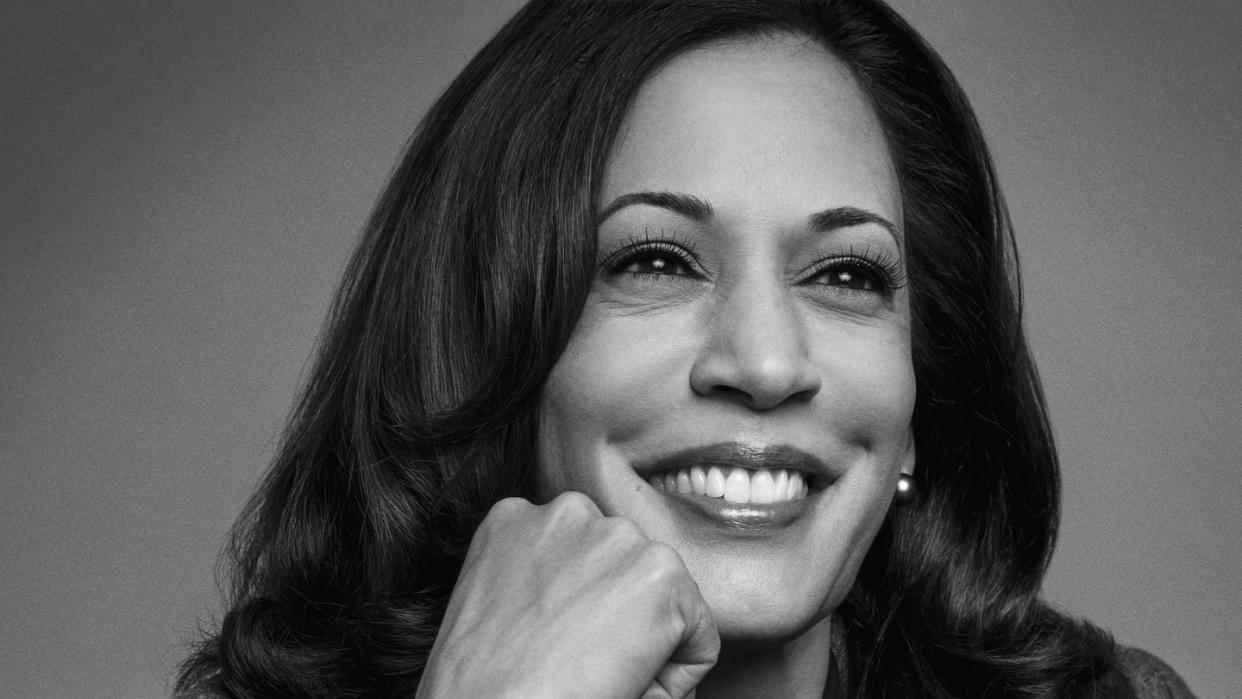
- Oops!Something went wrong.Please try again later.
"Hearst Magazines and Yahoo may earn commission or revenue on some items through these links."
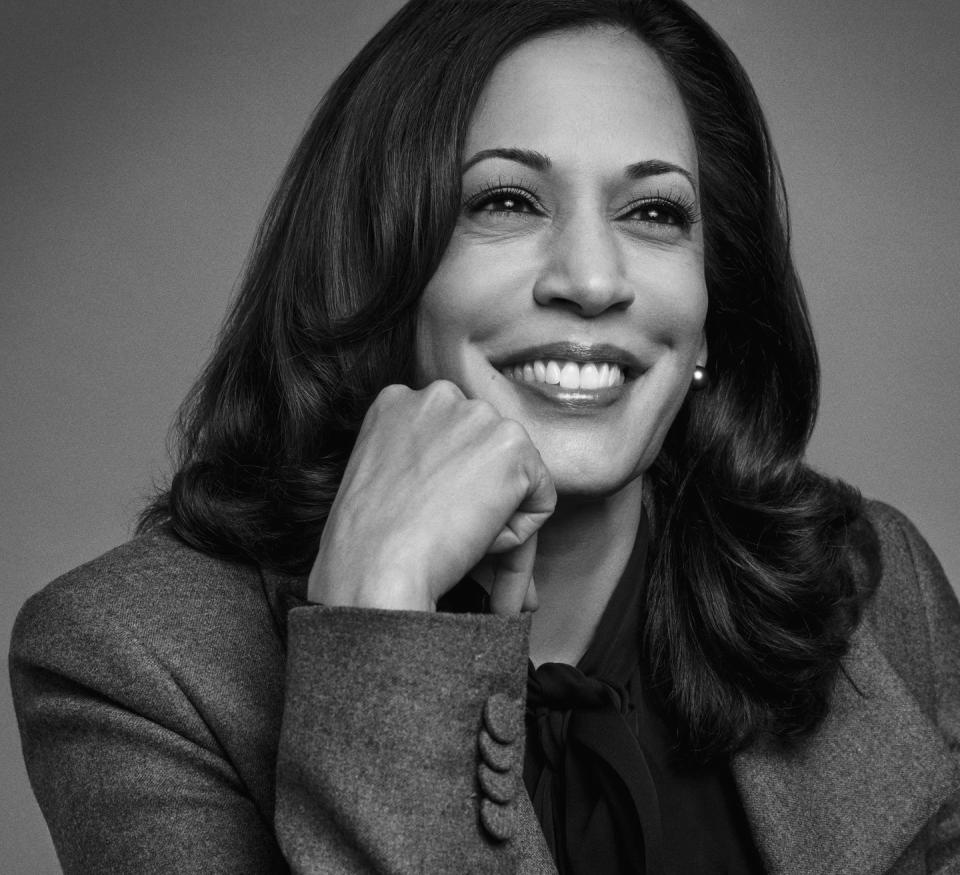

On what should have been the 51st anniversary of Roe v. Wade in late January, the press pool gathered near the wing of Air Force Two at Joint Base Andrews, awaiting the arrival of Vice President Kamala Harris on a marine helicopter. The pool was almost all women that day—a rarity, I was told, though not a surprise given the subject matter of the trip.
The VP would soon take off for Waukesha County, Wisconsin, where she would launch her Fight for Reproductive Freedoms, a nationwide tour in response to the Supreme Court’s landmark decision in Dobbs v. Jackson Women’s Health Organization, which overturned the long-held right to abortion in America.
After a nearly two-hour flight and some decent breakfast burritos (the other reporters told me the food on Air Force One is better), we landed on an icy runway and traveled by motorcade to the headquarters of the local painters’ union in Big Bend, a village of around 1,483 people about 30 minutes outside of Milwaukee. The location may seem a bit obscure, but it’s a place like this, and suburban voters like these, who could decide the outcome in this pivotal swing state in the November elections.
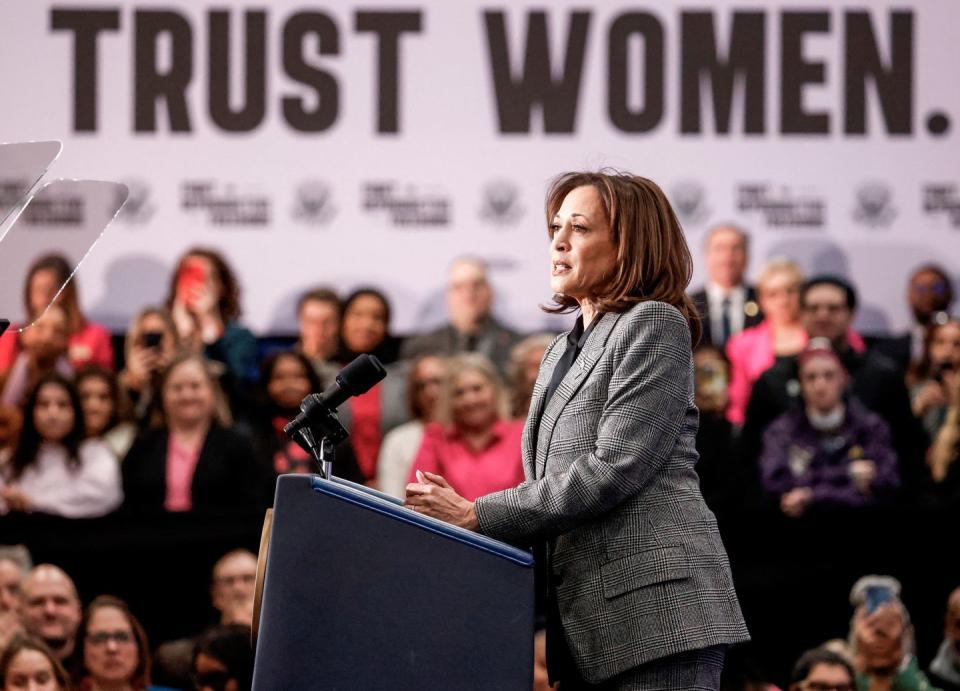
As a few cries of “MVP! MVP!” rang out, Harris took the stage, launching into a condemnation of draconian abortion restrictions: “In the last 19 months, in states across our nation, extremists have proposed and passed laws that criminalize doctors and punish women; laws that threaten doctors and nurses with prison time, even for life, simply for providing health care; laws that, in some states, make no exception, even for rape and incest.” She told a story about when she was in high school and took in one of her best friends to live with her after learning her friend was being molested by her stepfather. With passion in her voice, Harris added, “So the idea that someone who survives a crime that is a violation to their body, and then would not have the authority to decide what happens to their body next? That’s immoral. It’s immoral.”
Harris has put the full force of her office behind the fight for abortion rights. Since the overturn of Roe, she has held more than 60 events in 20 states and brought together 250-plus legislators from 28 states—and this was before she went on tour.
Seeing the vice president of the United States onstage speaking powerfully about the lack of abortion access as a health-care crisis, of women being turned away from emergency rooms by petrified doctors, of developing sepsis because they were denied basic health care, is a scene that would have been hard to imagine even a decade ago. “Look, I remember politicians who, 10 years ago, would run away from abortion,” says Planned Parenthood Action Fund president and CEO Alexis McGill Johnson. “They would say, ‘Oh, just get me elected; I can’t talk about it now. It’s politically unsafe.’” Now abortion is at the center of a major party campaign platform, and the incumbent VP is leading the charge without shame or apology. In March, she became the first president or vice president to visit an abortion clinic.
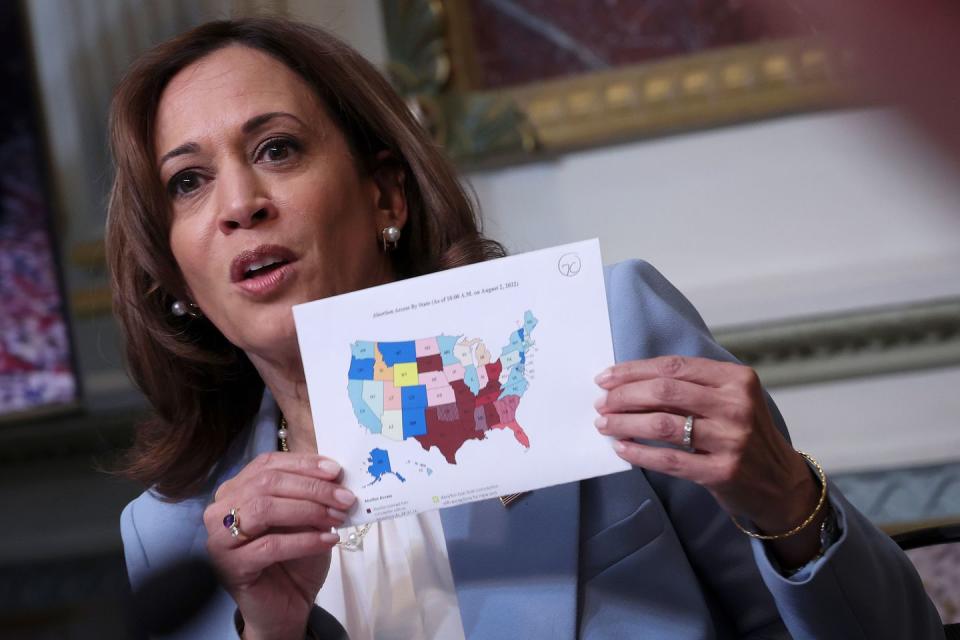
Harris’s campaign for reproductive freedom is a striking example of what happens when you elect a woman to the highest levels of government; of the power that can come from a woman having a seat at all the tables; of the impact of having someone speak on abortion on behalf of the half of the population she represents.
In an interview backstage after her speech, I ask what Harris thinks makes her an effective messenger on this issue. “I am the first woman vice president of the United States in its history, and I feel a very strong sense of duty to elevate and give voice to issues in particular where people are suffering and where there is an injustice, where there is harm,” she tells me. “I feel a sense of duty and responsibility in those moments to lift up voices, to build community and awareness about what we each should do and [how we] have a responsibility to look out for other people.”

Her impassioned tone onstage in Wisconsin was reminiscent of her viral turns on the debate stage or in congressional hearings. Watching her, I remembered why people were excitedly tweeting about her four years ago. On some other issues in the VP’s portfolio, especially migration and the U.S.-Mexico border, Harris has rarely been able to resonate with the public. When she speaks about reproductive rights, though, she’s in the zone. In meetings with other leaders, McGill Johnson says Harris consistently calls attention to the abortion access crisis: “She’s thoughtful about how she brings individual stories to light to help people understand the magnitude. ‘This is not about someone over there. This could be you.’”
Many male politicians don’t seem to understand how furious women are about the overturning of Roe but Harris does. “What they’re doing, in kicking off this tour, is telling all those people who said abortion wasn’t going to continue to be an issue—that we were just going to fall in line with the new reality, that we weren’t going to fight back—what they’re saying is, ‘No, the rage is still real,’” McGill Johnson says.
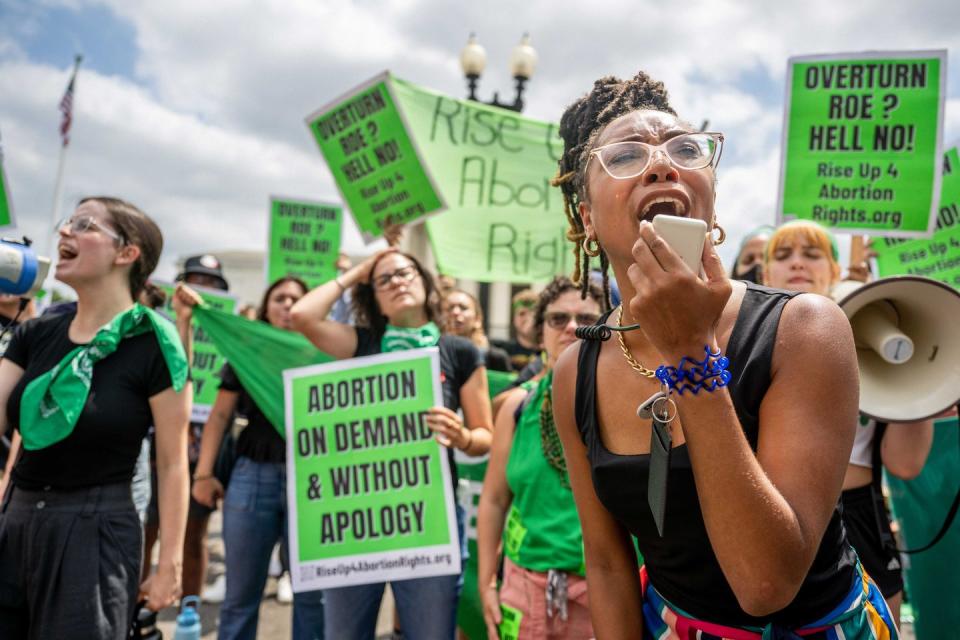
The vice president channels that rage in her speeches, but she also imbues a sense of empathy and understanding toward her fellow woman. “There is a whole lot of stigmatizing that is happening around this, and it’s heavily laden with judgment,” Harris tells me. “Suggesting that it’s a certain type of person [who gets an abortion] when in fact that’s not true. Suggesting that she did something wrong, that she should be embarrassed, which means she should feel alone.”
Harris’s team chose to make Waukesha County, Wisconsin, the first stop of her tour for good reason. The county has long been ruby red, but Republicans have been losing ground: Republican Senator Ron Johnson’s winning margin shrunk by five percentage points here in the 2022 midterms, while GOP support in the governor’s race dropped by six percentage points. Support for the GOP has been eroding at the same time that the party has embraced restrictive abortion measures.
In Wisconsin, abortion was virtually inaccessible for 15 months following the Dobbs decision, thanks to an 1849 state statute (on the books since before women could vote) that some conservatives interpreted as a ban. Governor Tony Evers and Attorney General Josh Kaul, both Democrats, filed a lawsuit days after the Dobbs ruling to challenge the 19th-century law. Evers’s and Kaul’s reelection in 2022 was seen as pivotal: Had they not won, their GOP opponents said they would have ended the case. In December 2023, a circuit court judge ruled the law did not apply to abortion. Planned Parenthood resumed providing abortions at three of its Wisconsin clinics by the end of the year.
Wisconsinites were fired up. In April 2023, they elected a liberal, pro-choice woman by a wide margin to the Wisconsin State Supreme Court, wresting majority control from conservatives for the first time in 15 years. That court is expected to uphold the district court’s ruling if given the chance, and could effectively overturn the 1849 law for good.
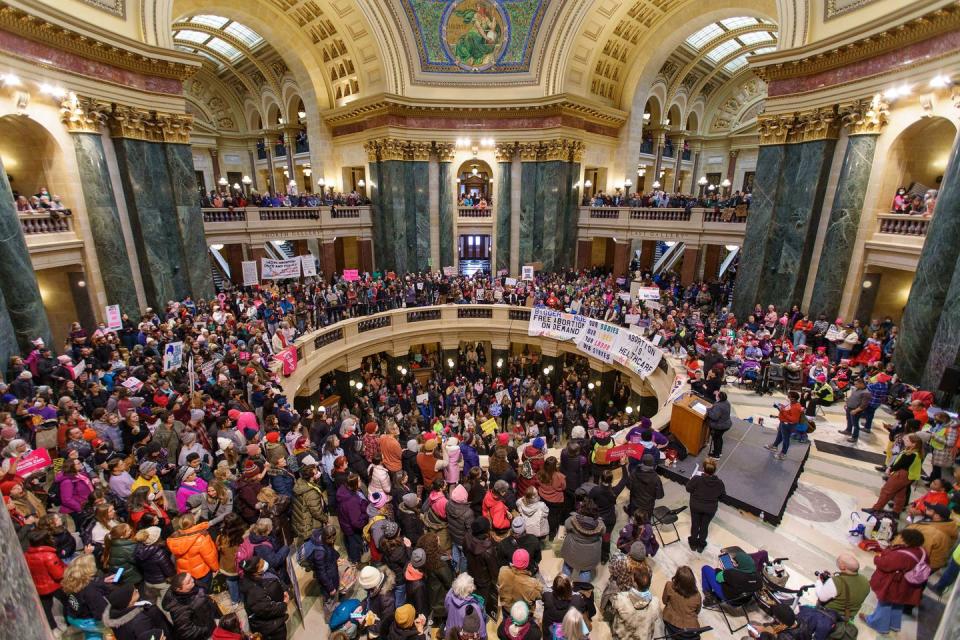
What happened in Wisconsin is reflective of a larger national trend. A July 2023 Gallup report found 85 percent of Americans believe abortion should be legal in certain or all circumstances. And, well, they’re voting like it. Every chance voters have had—seven in total—to vote on abortion ballot measures since the Dobbs decision, even in off-year and special elections, and in conservative states like Ohio, Kansas, and Kentucky, they have voted in favor of reproductive rights.
Democrats have gotten the message: Abortion is a winning issue. The party’s new line of attack draws a clear distinction between a second Trump presidency and the possibility of a national abortion ban versus a second term for Biden and the restoration of protections for reproductive care.
Backstage after her speech, Harris tells me she’s not worried voter enthusiasm will wane in the 10 months between the tour launch and Election Day. “Voters are fired up because first and foremost…we are talking about the lived experience for many people, and an understanding of the fairness of it, and just the fact that we as Americans, we fight for freedoms—plural,” Harris says. “And the idea that the government will come in and tell somebody what to do with their body is fundamentally offensive to many Americans.”
Harris kicked off her tour the day after the Biden reelection campaign released a powerful new ad, the first with a decidedly new tenor on abortion. Titled “Forced,” it featured Austin Dennard, MD, a Texas ob-gyn and mother of three, who had to travel out of state for an abortion after learning her fetus had a fatal condition. And the day after her tour launched, Harris joined President Joe Biden, First Lady Dr. Jill Biden, and Second Gentleman Doug Emhoff at a campaign rally for reproductive rights in Virginia. It was the first time the foursome have appeared together since the reelection campaign began, and further evidence of the importance Democrats are placing on abortion rights this cycle.
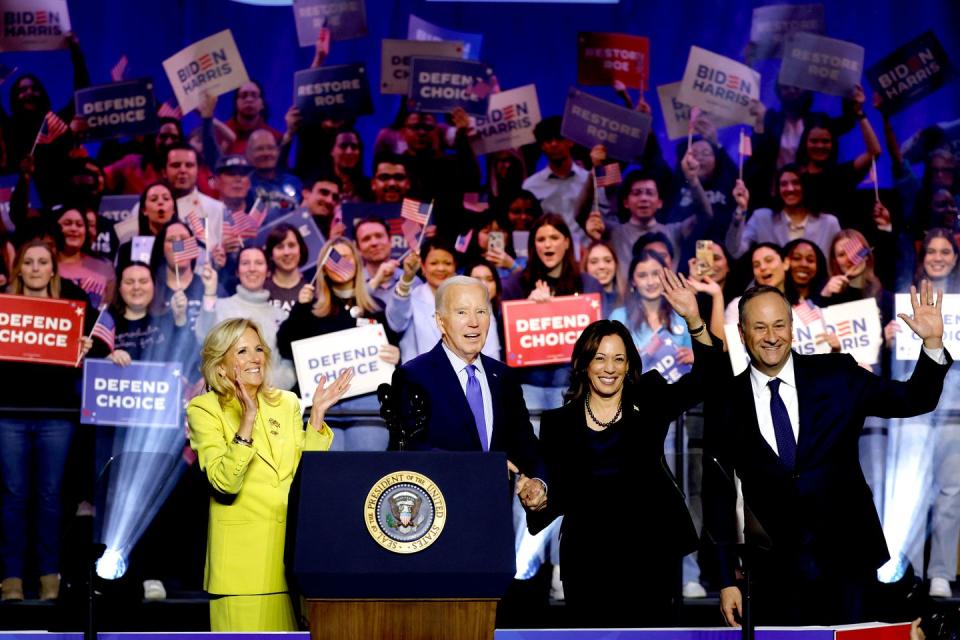
Until recently, Biden had been reluctant to explicitly defend reproductive rights, telling donors at a fundraiser last June that he is “not big” on abortion. While since the early days of his political career, Biden has supported an individual’s right to an abortion, he opposed federal funding for abortion care until 2019 and has been one of the party’s moderate voices on the issue. (At a fundraiser in February, to the ire of many Democrats, he expressed his opposition to “abortion on demand”—a phrase that has become a GOP talking point.)
Though Harris follows the administration’s line, she seemingly carries no such hang-ups. “It is health care. It is health care,” she tells me of abortion care when we talk. Her authoritativeness leading on reproductive rights means she can vouch for the president.
“Thirty years ago, it would have been unthinkable to say we would have a Black vice president speaking about abortion in such a nuanced way. That is something to be celebrated,” says Oriaku Njoku, executive director of the National Network of Abortion Funds. “Just as a Black woman witnessing another Black woman be out there talking about abortion access in the unapologetic way that she is, is deeply encouraging. At least to me it says, ‘Yes, we have a voice in this conversation.’ She’s doing the work. She’s not afraid to say ‘abortion.’ And I believe what she is saying.”
This article appears in the April 2024 issue of ELLE.
You Might Also Like

